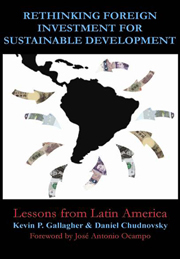Book contents
- Frontmatter
- Contents
- List of Figures
- List of Tables
- Foreword
- Acknowledgements
- Author Biographies
- Rethinking Foreign Investment for Sustainable Development
- 1 FDI and Sustainable Development in the Americas
- 2 Is Foreign Investment Always Good for Development?
- Part 1 Country Assessments
- Part 2 Political Economy of Natural Resources and The Environment
- 7 Investment Rules and Sustainable Development: Preliminary Lessons from the Uruguayan Pulp Mills Case
- 8 Foreigners in the Forests: Saviors or Invaders?
- 9 Bucking the Trend: The Political Economy of Natural Resources in Three Andean Countries
- 10 Beyond Pollution Haloes: The Environmental Effects of FDI in The Pulp and Paper and Petrochemicals Sectors in Brazil
- 11 Missing Links, Dashed Hopes: FDI Spillovers and Sustainable Industrial Development in Mexico's Silicon Valley
- Notes
- References
- Index
11 - Missing Links, Dashed Hopes: FDI Spillovers and Sustainable Industrial Development in Mexico's Silicon Valley
from Part 2 - Political Economy of Natural Resources and The Environment
Published online by Cambridge University Press: 05 March 2012
- Frontmatter
- Contents
- List of Figures
- List of Tables
- Foreword
- Acknowledgements
- Author Biographies
- Rethinking Foreign Investment for Sustainable Development
- 1 FDI and Sustainable Development in the Americas
- 2 Is Foreign Investment Always Good for Development?
- Part 1 Country Assessments
- Part 2 Political Economy of Natural Resources and The Environment
- 7 Investment Rules and Sustainable Development: Preliminary Lessons from the Uruguayan Pulp Mills Case
- 8 Foreigners in the Forests: Saviors or Invaders?
- 9 Bucking the Trend: The Political Economy of Natural Resources in Three Andean Countries
- 10 Beyond Pollution Haloes: The Environmental Effects of FDI in The Pulp and Paper and Petrochemicals Sectors in Brazil
- 11 Missing Links, Dashed Hopes: FDI Spillovers and Sustainable Industrial Development in Mexico's Silicon Valley
- Notes
- References
- Index
Summary
Introduction
Foreign direct investment has been studied for its impacts on development and its impacts on environment, but rarely for both at the same time. Despite an occasional nod to the environment, development scholarship as a whole tends to focus on economic goals—growth, industry upgrading or poverty alleviation. Environmental analysts, on the other hand, often take the economic benefits (or costs) of foreign direct investment (FDI) as a given and seek to uncover evidence of negative or positive externalities for the natural environment.
Using a case study methodology, this paper examines the impacts of FDI on sustainable industrial development—an integrated concept combining economic, environmental and social outcomes. We define sustainable industrial development as evolution along a three-dimensional path delineated by: (1) upgrading of the productive capacities of domestic firms; (2) employment creation, and (3) reduction of the ecological and health impacts of industrial growth and transformation.
For FDI to promote sustainable industrial development, transnational corporations (TNCs) must be linked to local firms, workers and consumers. In particular, they must generate—and host—country firms must absorb-two kinds of knowledge spillovers: technology and skills relevant to domestic industry upgrading and technology and management practices that reduce the ecological footprint of industry. A widespread and dynamic process of industry upgrading, in turn, generates high employment. Without spillovers, especially to local small- and medium-size firms (SMEs), the benefits of FDI tend to be narrowly concentrated in a few, usually urban, enclaves.
- Type
- Chapter
- Information
- Rethinking Foreign Investment for Sustainable DevelopmentLessons from Latin America, pp. 217 - 240Publisher: Anthem PressPrint publication year: 2009



